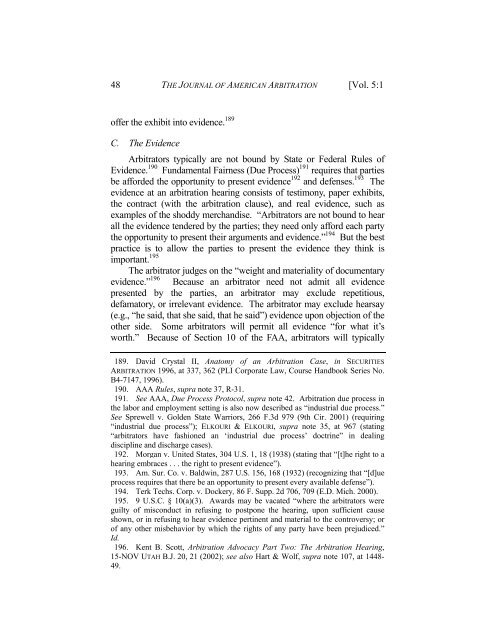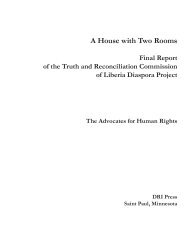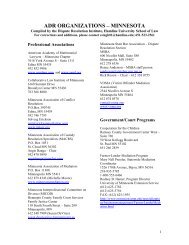2006/Vol. 5 No.1 - Hamline Law - Hamline University
2006/Vol. 5 No.1 - Hamline Law - Hamline University
2006/Vol. 5 No.1 - Hamline Law - Hamline University
You also want an ePaper? Increase the reach of your titles
YUMPU automatically turns print PDFs into web optimized ePapers that Google loves.
48 THE JOURNAL OF AMERICAN ARBITRATION [<strong>Vol</strong>. 5:1<br />
offer the exhibit into evidence. 189<br />
C. The Evidence<br />
Arbitrators typically are not bound by State or Federal Rules of<br />
Evidence. 190 Fundamental Fairness (Due Process) 191 requires that parties<br />
be afforded the opportunity to present evidence 192 and defenses. 193 The<br />
evidence at an arbitration hearing consists of testimony, paper exhibits,<br />
the contract (with the arbitration clause), and real evidence, such as<br />
examples of the shoddy merchandise. “Arbitrators are not bound to hear<br />
all the evidence tendered by the parties; they need only afford each party<br />
the opportunity to present their arguments and evidence.” 194 But the best<br />
practice is to allow the parties to present the evidence they think is<br />
important. 195<br />
The arbitrator judges on the “weight and materiality of documentary<br />
evidence.” 196 Because an arbitrator need not admit all evidence<br />
presented by the parties, an arbitrator may exclude repetitious,<br />
defamatory, or irrelevant evidence. The arbitrator may exclude hearsay<br />
(e.g., “he said, that she said, that he said”) evidence upon objection of the<br />
other side. Some arbitrators will permit all evidence “for what it’s<br />
worth.” Because of Section 10 of the FAA, arbitrators will typically<br />
189. David Crystal II, Anatomy of an Arbitration Case, in SECURITIES<br />
ARBITRATION 1996, at 337, 362 (PLI Corporate <strong>Law</strong>, Course Handbook Series No.<br />
B4-7147, 1996).<br />
190. AAA Rules, supra note 37, R-31.<br />
191. See AAA, Due Process Protocol, supra note 42. Arbitration due process in<br />
the labor and employment setting is also now described as “industrial due process.”<br />
See Sprewell v. Golden State Warriors, 266 F.3d 979 (9th Cir. 2001) (requiring<br />
“industrial due process”); ELKOURI & ELKOURI, supra note 35, at 967 (stating<br />
“arbitrators have fashioned an ‘industrial due process’ doctrine” in dealing<br />
discipline and discharge cases).<br />
192. Morgan v. United States, 304 U.S. 1, 18 (1938) (stating that “[t]he right to a<br />
hearing embraces . . . the right to present evidence”).<br />
193. Am. Sur. Co. v. Baldwin, 287 U.S. 156, 168 (1932) (recognizing that “[d]ue<br />
process requires that there be an opportunity to present every available defense”).<br />
194. Terk Techs. Corp. v. Dockery, 86 F. Supp. 2d 706, 709 (E.D. Mich. 2000).<br />
195. 9 U.S.C. § 10(a)(3). Awards may be vacated “where the arbitrators were<br />
guilty of misconduct in refusing to postpone the hearing, upon sufficient cause<br />
shown, or in refusing to hear evidence pertinent and material to the controversy; or<br />
of any other misbehavior by which the rights of any party have been prejudiced.”<br />
Id.<br />
196. Kent B. Scott, Arbitration Advocacy Part Two: The Arbitration Hearing,<br />
15-NOV UTAH B.J. 20, 21 (2002); see also Hart & Wolf, supra note 107, at 1448-<br />
49.
















